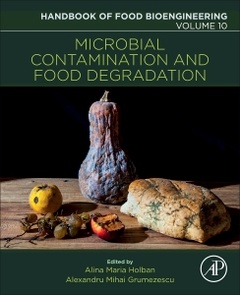Microbial Contamination and Food Degradation Handbook of Food Bioengineering Series
Coordonnateurs : Grumezescu Alexandru Mihai, Holban Alina Maria

Microbial Contamination and Food Degradation, Volume 10 in the Handbook of Food Bioengineering series, provides an understanding of the most common microbial agents involved in food contamination and spoilage, and highlights the main detection techniques to help pinpoint the cause of contamination. Microorganisms may cause health-threatening conditions directly by being ingested together with contaminated food, or indirectly by producing harmful toxins and factors that can cause food borne illness. This resource discusses the potential sources of contamination, the latest advances in contamination research and strategies to prevent contamination using key methods of analysis and evaluation.
2. Microbial contamination, prevention and early detection in food industry
3. Microbiological Contamination in Foods and Beverages: Consequences and Alternatives in the Era of Microbial Resistance
4. Quorum sensing as a mechanism of microbial control and food safety
5. Food Degradation and Food-borne Diseases: A Microbial Approach
6. Fresh cut fruits: microbial degradation and preservation
7. Occurrence of natural toxins in seafood
8. Biopreservatives as agents to prevent food spoilage
9. Wine microbial spoilage: advances in defects remediation
10. Near Infrared spectral informative indicators for meat and dairy products bacterial contamination and freshness evaluation
11. Use of bacterial growth curve for assessing risk of microbiological pathogens in food products
12. Biosensors and express control of bacterial contamination of different environmental objects
13. Mycotoxins in Foods: Mycotoxicoses, Detection and Management
14. Multiple-locus variable-number of tandem-repeats analysis (MLVA) as subtyping technique for foodborne pathogens
15. Antimicrobial and antioxidant properties of essential oils in food systems - An overview
Alina-Maria Holban is a lecturer in Microbiology and Immunology, at the Faculty of Biology, University of Bucharest; and associate researcher at the University Politehnica of Bucharest, Romania. Her primary area of research is the development of bionanomaterials with antimicrobial applications. Dr. Holban has published 75 papers in peer-reviewed journals, 42 conference/symposia proceedings, and has edited more than 21 edited books.
- Presents modern alternatives for avoiding microbial spoilage and food degradation using preventative and intervention technologies
- Provides key methods for addressing microbial contamination and preventing food borne illness through research and risk assessment analysis
- Includes detailed information on bacterial contamination problems in different environmental environments and the methodologies to help solve those problems
Date de parution : 10-2017
Ouvrage de 514 p.
19x23.3 cm
Thème de Microbial Contamination and Food Degradation :
Mots-clés :
acetic acid bacteria; action mode; aflatoxins; antimicrobials; bacterial communication; bacterial contamination; bacterial growth curve; bacteriocins; biofilms; biogenic amines; biological properties; biopreservatives; biosensors; cold gas plasma; contamination; control; dairy products; degradation; detection; deterioration; dispersion; ergot; essential oils; ethyl carbamate; exponential growth equation; fining agents; fish; food industry; food pathogens; food-borne bacterial pathogens; foodborn



